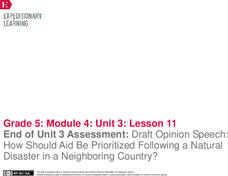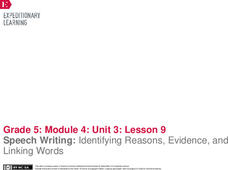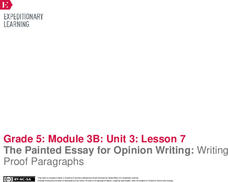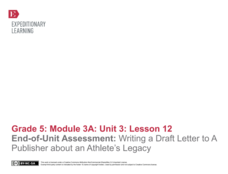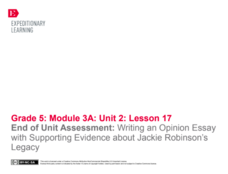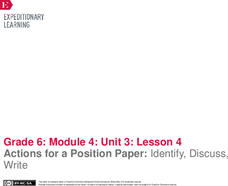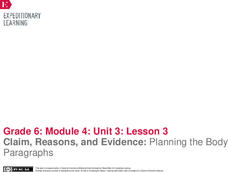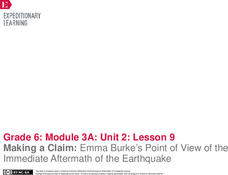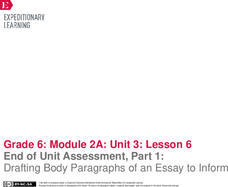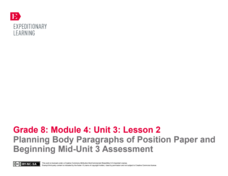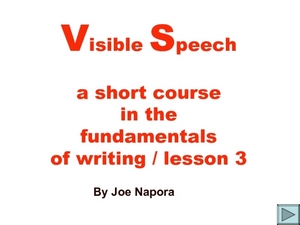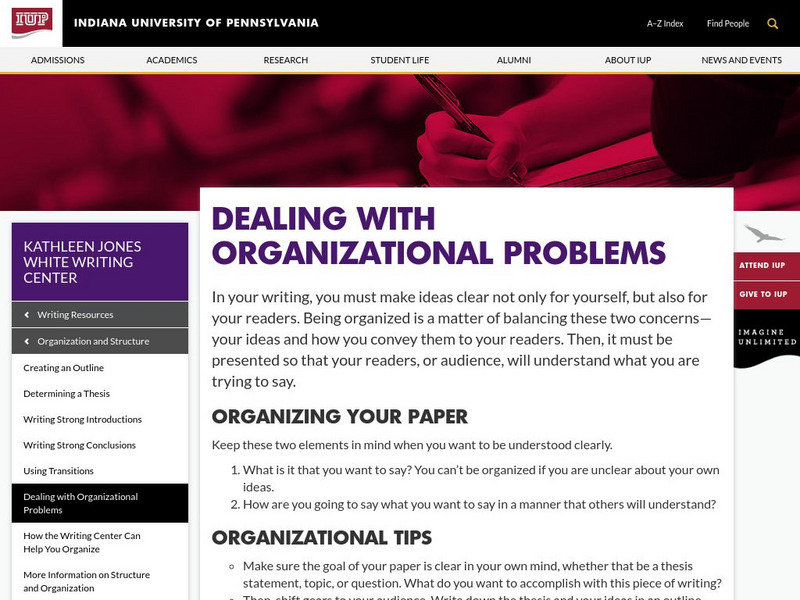Core Knowledge Foundation
Unit 6: American Revolution
The American Revolution is the theme of a five-week unit that focuses on reading, grammar, morphology, and writing. Scholars read and respond to texts, practice spelling and word work, and write paragraphs. Assessments gauge comprehension.
ReadWriteThink
Persuasive Essay: Environmental Issues
Young environmentalists learn how to craft a persuasive essay about an environmental issue they consider important. After studying the components of a persuasive essay and examining a student model, writers brainstorm possible topics and...
EngageNY
End of Unit 3 Assessment: Draft Opinion Speech: How Should Aid Be Prioritized Following a Natural Disaster in a Neighboring Country?
Put it to the test. With the cumulative resource, pupils complete the End of Unit 3 Assessment. Using everything they've learned in the unit, they write a draft of an opinion speech about how to prioritize aid after a natural disaster.
EngageNY
Speech Writing: Identifying Reasons, Evidence, and Linking Words
Enjoy the view. Scholars continue viewing a video of an opinion speech, this time identifying the supporting evidence the speaker employs. After watching, they work in small groups on their shared writing projects, crafting a body...
EngageNY
The Painted Essay for Opinion Writing: Writing Proof Paragraphs
It's time to proof read! Pupils read and analyze proof paragraphs from a model essay. They then practice writing their own proof paragraphs to express an opinion about offshore oil drilling.
EngageNY
End-of-Unit Assessment: Writing a Draft Letter to A Publisher about an Athlete’s Legacy
Serving as the end-of-unit assessment, scholars draft letters to a publisher about an athlete's legacy. They then reflect on their progress by completing a self-assessment.
EngageNY
End of Unit Assessment: Writing an Opinion Essay with Supporting Evidence about Jackie Robinson’s Legacy
Learners complete the end of unit assessment by writing an opinion essay about how Jackie Robinson changed America. They use evidence from the text, Promises to Keep, to support their opinions.
EngageNY
Writing a Second Body Paragraph and Conclusion for an Opinion Essay: Jackie Robinson’s Role in the Civil Rights Movement (Promises to Keep, Pages 50–57)
Class members begin to work on the body paragraphs of their opinion essays about Jackie Robinson started in the previous lesson plan. They analyze a model paragraph and underline reasons for the opinion. Learners then take part in a mini...
EngageNY
Actions for a Position Paper: Identify, Discuss, Write
Anchors aweigh, it's time to write! After viewing an anchor chart detailing the parts of a position paper, pupils share their plans for their essays with a partner. Next, they write the rough draft of their body paragraphs.
EngageNY
Claim, Reasons, and Evidence: Planning the Body Paragraphs
Planning is the key to success. Scholars continue planning their essays by adding reasons to their Planning My Argument graphic organizers. Additionally, pupils analyze a body paragraph from a model position paper, identifying the...
EngageNY
Making a Claim: Moon Shadow’s Point of View of the Immediate Aftermath
Body paragraphs are the building blocks of every essay. Pupils view and discuss a model essay using a rubric to evaluate one of its supporting paragraphs. Next, scholars use what they've learned to continue drafting their own literary...
EngageNY
Making a Claim: Emma Burke’s Point of View of the Immediate Aftermath of the Earthquake
Sharpen those pencils; it's time to write! Scholars begin writing the first body paragraph of their literary analysis essays. Additionally, pupils use graphic organizers to analyze a character's point of view from Laurence Yep's...
EngageNY
End of Unit Assessment, Part 1: Drafting Body Paragraphs of an Essay to Inform
Anybody can write a body paragraph! Pupils analyze the development of ideas in a body paragraph from a model essay. Next, using what they've learned, they draft the body paragraphs of their My Rule to Live By informative essay.
EngageNY
Planning Body Paragraphs of Position Paper and Beginning Mid-Unit 3 Assessment
The best sandwiches aren't always edible. Pupils use a Quote Sandwich graphic organizer to plan paragraphs two and three of their position papers about the best food chain. Next, they begin drafting their body paragraphs for the mid-unit...
EngageNY
Grade 9 ELA Module 4, Unit 1, Lesson 25
After analyzing the strengths and weaknesses of the evidence they have recorded on their argument outline tool, writers draft their essay's first body paragraphs, ensuring they have properly cited their source material.
EngageNY
Writing: Drafting Body Paragraphs and Revising for Language
Begin the drafting phase of the writing process with a lesson plan focused on logically writing three body paragraphs. Then, revise the writing to make it more formal after a teacher-directed mini-lesson plan. Each paragraph highlights...
Student Handouts
Four-Square Writing Method
Pupils produce paragraphs with planning and precision with the four-square writing method, which allows learners to organize the topic, supporting, and summary sentences of their paragraphs.
Vista Murrieta High School
English II Research Paper Packet
If your school requires a senior research paper or if you are considering one for your class, then this resource is for you. The 43-page packet includes everything from a sample letter to parents to requirements, from topic suggestions...
Curated OER
Basic Five Paragraph Essay
Introduce your young writers to the basic five-paragraph essay. The fun part of this presentation is the stance of the essay used to illustrate the format. The writer of the model essay contends that the Twilight series is a terrible...
Curated OER
Outlines and Organization: Sample Outline
Provide your essay writers with a sample essay outline. Richly detailed, this two-page handout not only describes the necessary parts of an outline, but also explains the purpose of each section. A model outline is also included.
Curated OER
Writing the Five Paragraph Essay: Some basic rules for writing that you should always follow!
Need a quick review of the format of the five-paragraph essay? The strength of this presentation is in the color-highlighted examples used to illustrate the terms. Consider adding additional slides that provide a model of a complete essay.
Curated OER
The Structure of an Essay
Using the analogy of the human body, writing an essay is described in these slides. An overall look at writing, the analogy is meant to have writers consider how their paper functions as a whole. Details and instructions for writing are...
Curated OER
Visible Speech: A Short Course in the Fundamentals of Writing/Lesson 3
Focusing on writing an introduction, this presentation provides a variety of techniques for how to begin. Although the question marks on slide six obscure the writing, the other slides are clear and legible and display good examples for...
Other
Indiana University of Pennsylvania: Writing Center: Organizational Problems
This Indiana University of Pennsylvania Writing Center article provides tips to help students with essay organizational problems. The article suggests that students look at the essay's introduction, thesis, transitions, body paragraphs,...




